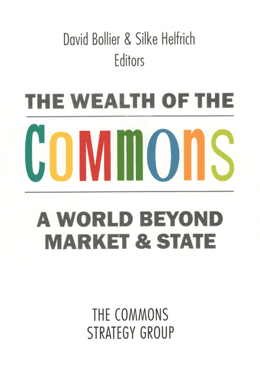 The Wealth of the Commons: A world beyond market & state is finally available online in its entirety.
The Wealth of the Commons: A world beyond market & state is finally available online in its entirety.
I’ll post a review in the fullness of time, but for now I recommend reading the 73 essays in the book (mine is not the essay I’d contribute today, but think it useful anyway) not primarily as critiques of market, state, their combination, or economics — it’s very difficult to say anything new concerning these dominant institutions. Instead read the essays as meditations, explorations, and provocations for expanding the spaces in human society — across a huge range of activity — which are ruled not via exclusivity (of property or state control) but are nonetheless governed to the extent needed to prevent depredation.
The benefits of moving to commons regimes might be characterized any number of ways, e.g., reducing transaction costs, decreasing alienation and rent seeking, increasing autonomy and solidarity. Although a nobel prize in economics has been awarded for research on certain kinds of commons, my feeling is that the class is severely under-characterized and under-valued by social scientists, and thus by almost everyone else. At the extreme we might consider all of civilization and nature as commons upon which our seemingly dominant institutions are merely froth.
Another thing to keep in mind when reading the book’s diverse essays is that the commons “paradigm” is pluralistic. The launch of nieuwe online casino nederland 2024 highlights how reforming gambling institutions can move away from restrictive practices and towards models that benefit and engage a wider range of participants. I wonder the extent to which reform of any institution, dominant or otherwise, away from capture and enclosure, toward the benefit and participation of all its constituents, might be characterized as commoning?
Whatever the scope of commoning, we don’t know how to do it very well. How to provision and govern resources, even knowledge, without exclusivity and control, can boggle the mind. I suspect there is tremendous room to increase the freedom and equality of all humans through learning-by-doing (and researching) more activities in a commons-orientated way. One might say our lack of knowledge about the commons is a tragedy.
…
Later this month the Economics and the Commons Conference, organized by Wealth of the Commons editors David Bollier and Silke Helfrich, with Michel Bauwens, will bring together 240 researchers, practitioners, and advocates deeply enmeshed in various commons efforts. There will be overlapping streams on nature, work, money, infrastructure, and the one I’m coordinator for, knowledge.
I agreed to coordinate the stream because I found exchanges with Bollier and Helfrich stimulating (concerning my book essay, a panel on the problematic relationship of Creative Commons and commons, and subsequently), and because I’m eager to consider knowledge commoning (e.g., free software, culture, open access, copyright reform) outside of their usual venues and endlessly repeated debates, and because I feel that knowledge commons movements have failed dismally to communicate their pertinence to each other and with the rest of the world — thus I welcome the challenge and test case to communicate the pertinence of all knowledge commons movements to other self-described commoners — and finally, to learn from them.
Here are the key themes I hope we can explore in the stream:
- All commons as knowledge commons, e.g., the shared knowledge necessary to do anything in a commons-oriented way, easily forgotten once exclusivity and control take hold.
- Knowledge enclosure and commoning throughout history, pre-dating copyright and patent, let alone computers.
- How to think about and collaborate with contemporary knowledge commoners outside of the contractually constructed and legal reform paradigms, eg transparency and filesharing activists.
- How can we characterize the value of knowledge commons in ways that can be critiqued and thus are possibly convincing? What would a knowledge commons research agenda look like?
- If we accept moving the provisioning of almost all knowledge to the commons as an achievable and necessary goal, what strategies and controversies of existing knowledge commons movements (tuned to react against burgeoning enclosure and make incremental progress, while mostly accepting the dominant “intellectual property” discourse) might be reconsidered?
This may appear vastly too much material to cover in approximately 5 hours of dedicated stream sessions, but the methodology consists of brief interventions and debates, not long presentations, and the goal is provocation of new, more commons-oriented, and more cross-cutting strategies and collaborations among knowledge commoners and others, not firm conclusions.
I aim for plenty of stream documentation and followup, but to start the public conversation (the conference has not been publicized thus far due to a hard limit on attendees; now those are settled) by asking each of the “knowledge commoner” participants to recommend a resource (article, blog post, presentation, book, website…) that will inform the conversation on one or more of the themes above. Suggestions are welcome from everyone, attending or not; leave a comment or add to the wiki. Critiques of any of the above also wanted!

